| Srl | Item |
| 1 |
ID:
183578
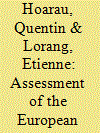

|
|
|
|
|
| Summary/Abstract |
This paper investigates the design of a recent regulatory proposal aimed at favoring the emergence of a battery recycling industry in Europe. Electric mobility is deemed necessary to cut CO2 emissions in the transport sector but the industrial and environmental impacts of lithium-ion battery manufacturing are controversial. A recent regulatory proposal from the European Commission introduces the obligation to attain a series of minimum thresholds of recycled materials for the new batteries to be manufactured after 2030. This paper discusses the conditions required for that obligation to be fulfilled. It develops a material flow model that projects battery wastes and their recycling potential. Our findings indicate that the feasibility of proposed thresholds is not very sensitive to changes of material intensities from battery technology shifts, recycling efficiencies, or the faster uptake of demand. On the contrary, battery lifetimes are the most crucial parameters for recycling potential. We believe that this result could jeopardize avenues for extending battery lifetimes such as second-life battery usage. Our policy recommendations are twofold. First, we recommend lower thresholds to improve the regulation credibility. Second, the regulation should integrate other objectives that address the lifetime of batteries.
|
|
|
|
|
|
|
|
|
|
|
|
|
|
|
|
| 2 |
ID:
142844
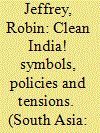

|
|
|
|
|
| Summary/Abstract |
This essay assesses the Swachh Bharat! or Clean India! campaign of Prime Minister Narendra Modi's government. The essay identifies the immense scope of the task—to create a ‘clean India’ by 2019—the pressures that make improved public sanitation urgent and the prime minister's experience in the state of Gujarat that may encourage him to believe that achievements are possible. The essay gauges the political risks and benefits for a prime minister noted for his media proficiency and keen sense of symbolism.
|
|
|
|
|
|
|
|
|
|
|
|
|
|
|
|
| 3 |
ID:
148272
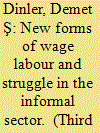

|
|
|
|
|
| Summary/Abstract |
In the absence of formal employment opportunities and with increasing urban and rural poverty, the informal recycling sector has become a means of survival for the past two decades in Turkey. In the capital city, Ankara, the large majority of waste pickers constitute former dispossessed Kurdish farmers who migrated to the city with their families from the southeastern regions as a result of forced migration, and seasonal Kurdish workers who alternate between rural and urban employment. The introduction of new waste management regulations in 2004 made the recycling market a significant area of struggle between local authorities, recycling companies and waste pickers. Local authorities have used these regulations to force waste pickers to sell their waste to certain recycling companies at a price lower than the market price. Waste pickers have reclaimed their right to work in the streets against the violence executed by the municipal police. This paper investigates the ways in which waste pickers should be considered wage labourers and what kind of a moral discourse they have used in making their demands vis-à-vis local governments during the process of intense conflict and negotiation.
|
|
|
|
|
|
|
|
|
|
|
|
|
|
|
|
| 4 |
ID:
099311
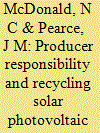

|
|
|
|
|
| Publication |
2010.
|
| Summary/Abstract |
Rapid expansion of the solar photovoltaic (PV) industry is quickly causing solar to play a growing importance in the energy mix of the world. Over the full life cycle, although to a smaller degree than traditional energy sources, PV also creates solid waste. This paper examines the potential need for PV recycling policies by analyzing existing recycling protocols for the five major types of commercialized PV materials. The amount of recoverable semiconductor material and glass in a 1 m2 area solar module for the five types of cells is quantified both physically and the profit potential of recycling is determined. The cost of landfill disposal of the whole solar module, including the glass and semiconductor was also determined for each type of solar module. It was found that the economic motivation to recycle most PV modules is unfavorable without appropriate policies. Results are discussed on the need to regulate for appropriate energy and environmental policy in the PV manufacturing industry particularly for PV containing hazardous materials. The results demonstrate the need to encourage producer responsibility not only in the PV manufacturing sector but also in the entire energy industry.
|
|
|
|
|
|
|
|
|
|
|
|
|
|
|
|
| 5 |
ID:
184595
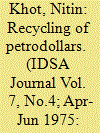

|
|
|
| 6 |
ID:
166534
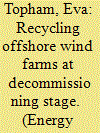

|
|
|
|
|
| Summary/Abstract |
Since Vindeby in 1991, more than 100 projects have been installed in Europe, and will need decommissioning one day. Despite the increasing number of projects reaching this phase, decommissioning is still an area that has received relatively little attention.
|
|
|
|
|
|
|
|
|
|
|
|
|
|
|
|
| 7 |
ID:
183237
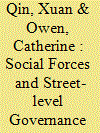

|
|
|
|
|
| Summary/Abstract |
This article interrogates the operating logic of China's street-level regulatory state, demonstrating that residents’ committees (RCs) assume a role as regulatory intermediaries to enhance the efficiency of local governance. Using Shanghai's new recycling regulations as a case study, it explores the mechanisms by which RCs elicit not only citizens’ compliance but also active participation. We show that the central mechanisms derive from the RCs’ skilful mobilization of particular social forces, namely mianzi and guanxi, which are produced within close-knit social networks inside Shanghai's housing estates (xiaoqu). We advance three arguments in the study of China's emerging regulatory state. First, we show how informal social forces are employed in regulatory governance at the street level, combining authoritarian control with grassroots participation. Second, the focus on RCs as regulatory intermediaries reveals the important role played by these street-level administrative units in policy implementation. Third, we suggest that the RCs’ harnessing of informal social forces is essential not only for successful policy implementation at street level but also for the production of the local state's political legitimacy.
|
|
|
|
|
|
|
|
|
|
|
|
|
|
|
|
| 8 |
ID:
141403
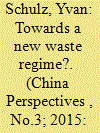

|
|
|
|
|
| Summary/Abstract |
This article explores how a multitude of entities vie for control over discarded electrical and electronic appliances in China. It analyses the strategies they deploy in order to gain or keep a competitive edge. Central government agencies, scientific research institutes, and large recycling groups, in particular, have recently joined forces with a view to redirecting flows of valuable consumer goods away from the so called “informal” sector of the economy, notably by creating high barriers to entry. They strive to distinguish themselves from small-scale recyclers by making ample use of green propaganda and narratives of technological progress. However, China’s state-sanctioned “management system” for “e-waste” recycling is not nearly as environmentally friendly as its proponents claim. It promotes a waste regime centred on "resources" – not products – and thereby contributes to accelerating and extending material cycles. Fully understanding its nature and impact requires seeing the link to other national policies, especially those promoting growth.
|
|
|
|
|
|
|
|
|
|
|
|
|
|
|
|